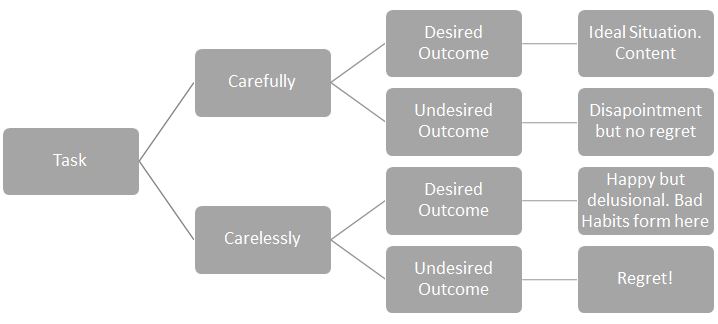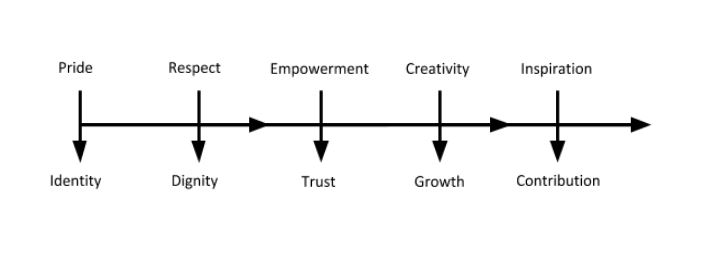Organizations are often held hostage by aggressive high performers who are great at meeting short term goals through pushing and ordering people around, but that comes at a high cost. Long term viability of any business is adversely affected if such conduct goes unchecked.
No two people are alike. We have different pasts, experiences and beliefs. We come from different backgrounds and cultures. As individuals each one of us is unique and is motivated by different things; yet, we are alike in many ways….Being able to leverage such diversity is what makes all the difference in performance. Understanding and working with difference is a key challenge for any manager to be effective.
Focus of this article is on managers who have a tendency to be very firm and demanding, with little or no concern for how their outbursts or mindless straightforwardness affects individuals and teams at the receiving end. Such a forthright behavior without tact and sense of timing, no matter how well meaning, harms an otherwise conducive work environment.
Organizations are often held hostage by aggressive high performers who are great at meeting short term goals through pushing and ordering people around, but that comes at a high cost. Long term viability of any business is adversely affected if such conduct goes unchecked.
It is important, however, not to write-off such people as trouble-makers. Instead, it would be worth our while to try and understand where they are coming from and what drives them to extreme behaviors.
Through counseling and coaching, it is quite possible, that ‘rough stones’ can be encouraged to turn themselves into diamonds. Often genuine concern for meeting demanding business objectives lead some managers to express themselves in ways that are unproductive.
Those who are overly aggressive tend to be more firm than fair. This is usually because they know no better. However, when such people ultimately do turn around, and a few do by finding the right balance in their leadership style, they become amazing allies of change and transformation.
In organizations, aggressive people are mostly feared or side-lined. This is largely because managers fail to confront such people with the intent to redirect their energy to a positive end.
How can we harness the energy of aggressive people to achieve business goals on a sustainable basis? Think about it. Why are some people aggressive and intolerant? Is this a habit? Or do events trigger an unreasonable behavior in them? When a subordinate explodes on another colleague in the office, in the presence of many, why do their bosses not attend to it promptly and effectively?
There can be many reasons for this, but one thing is clear, the answer to why we behave the way we do, lies in our past. The clues to our present behaviors can be traced back to when we were born, right through to the present time. However, the first seven to ten years of our lives are most significant. These early years can be likened to wet cement, where whatever falls on it, leaves a lasting impression, unless the matter is addressed there and then. Experts in the field of psychology maintain that our most qualified and competent teachers should be teaching in primary schools. This is the time when children are more impressionable. However, despite this knowledge, we live in a land where primary schools teachers are the least qualified and competent, and where parenting is neglected.
Erik Erikson, is known to be a giant developmental theorist. He suggests that we experience inner conflicts as we progress through life. How they get resolved along the way has a significant bearing to our present conduct. The following table is reproduced from the chapter on “The Socialization Process” from a book titled Child Development by John Santrock and Steven Yussen. It highlights the different stages through which we evolve and the inner conflicts we face:
Erikson’s Stages of Development
| Late adulthood (51+) |
Ego, Integrity vs despair |
| Middle adulthood (31-50) |
Generativity vs stagnation |
| Young adulthood (21-30) |
Intimacy vs isolation |
| Adolescence (16-20) |
Identity vs role confusion |
| Middle and late childhood (11-15) |
Industry vs inferiority |
| Early childhood (3-10) |
Initative vs guiltAutonomy vs shame, doubt |
| Infancy (0-2) |
Basic trust vs mistrust |
Based on the table above, the sources of aggression can be traced to our infancy and early childhood. For example, if a manager is behaving aggressively, it is quite possible that during childhood, he did not enjoy sufficient freedom to do things on his own and as a result started doubting his own abilities. When anyone uses excessive force to get things done, it could be because the idea is weak. Aggressive people tend to defend weak ideas.
In light of the foregoing, it becomes vital for managers to acquire in-depth knowledge about their colleagues and subordinates in an informal setting. Effective information exchange can take place only in a climate of trust. Without building and enjoying a good rapport with team mates, our efforts to coach or counsel falls by the way side. In fact our attempts to help can also be counter-productive.
Similarly, intolerance stems from us not trusting the process or people we work with. It’s our heightened sense of insecurity that makes it difficult for us to accept anything that is different from status quo i.e., we choose to cling to our comfort zone, and abhor contrarian thinking.
Habit is what we do repeatedly, without applying conscious thought to it. What lies dormant in our subconscious mind often gets triggered through events. For example, the sight of lizards gives some people the creeps – a response that is also a habit. When things are not done as told, some managers sense a loss of power – they feel insecure and behave aggressively.
There could be many reasons for why bosses hold back. It could either be their tactic or strategy of allowing time for things to simmer down. But this is usually not the case. Some bosses are slow in addressing difficult people and situations largely because of fear or apathy or lack of skill. In some ways, this behavior can be viewed as ‘Passive’, which is the other extreme of aggressive. Both ‘Passive’ and ‘Aggressive’ behaviors are acquired from our past experiences, particularly our early childhood.
Passive behavior is characterized by our failure to express our wants and needs honestly. Tendency to allow others to disregard our rights is also very evident in ‘passive’ individuals. On the other hand, aggressive people usually tend to only concern themselves with their own rights and privileges, and that too, at all costs, having no regard for the rights and feelings of others.
There are no easy answers, but as a pointer, seriously consider coaching and counseling. Coaching is for skills enhancement, where the coachee is usually keen to learn. Counseling, on the other hand, is for addressing attitudinal issues and as such can be very time-consuming at first. A company would be in real trouble if most of its people were in need of counseling.
Before you embark on a coaching strategy in your organization, it will be worth your while investigating how attuned your managers are to the subject. Ask them to share their perspectives on:
- What is coaching?
- How does one get a “buy-in” for coaching?
- What actions does a coach need to take?
- How is feedback provided to improve performance?
- How does one coach someone who knows more than the coach?
- What are the payoffs for the coach and the company?
Coaching and mentoring strategies are increasingly being welcomed by top companies to get the best out of people. The benefits show that coaching:
- Makes a marked difference to performance
- Gets even a beginner to perform competently and quickly
- Turns an average performer into someone with real strengths
- Best performers, too, need a coach to help them stretch themselves to become even better
In addition to becoming a better coach, most managers need to concentrate on becoming assertive, which is a delicate balancing act.
By being assertive, managers can deal with conflicts intelligently, facilitate positive changes in peoples’ behaviors, negotiate effectively with a variety of internal and external constituents, and lead the growth agenda of the organization, while keeping all stakeholders committed through the journey.
Assertiveness is a skill that can be learned to counter our inherited tendency to either be aggressive or passive.



